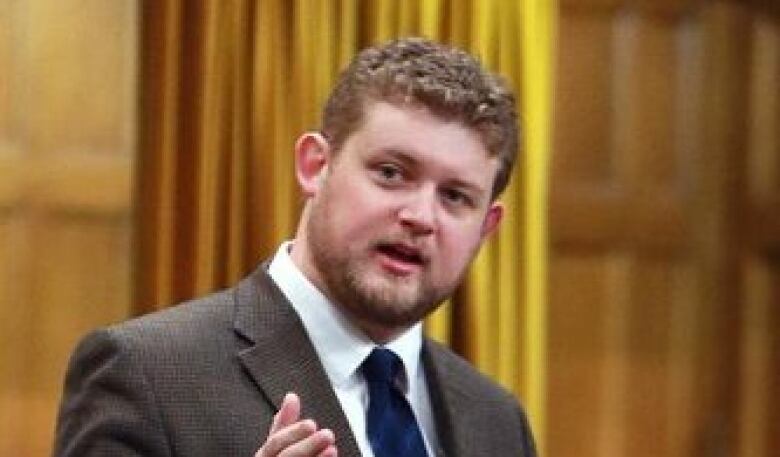Money laundering watchdog scrutinizes Facebook, social media
MP calls for parliamentary committee to investigate threat to privacy

Canadians who make large cash transactions, international wire transfers or win big at the casino could end up witha federal agency scrutinizing their Facebook pages and other social media posts, CBC News has learned.
The Financial Transactions and Reports Analysis Centre (FINTRAC), the federal government body charged with monitoring financial transactions to detect money laundering and terrorist financing, has been quietly scrutinizing the social media posts of Canadians whose transactions attract its attention.
FINTRAC defends the practice, saying the rules that govern it allow it to collect a variety of information.
"FINTRAC's mandate is to detect, deter and prevent money laundering and terrorist financing activity," spokespersonRene Bercier wrote in response to questions from CBC News.
"It is important to remember that the perpetrators of these crimes oftentimes have an online presence and actively use the web, including social media, to connect with associates, facilitate their activities and, in the case of terrorism financing, even raise funds."
Privacy concerns raised
However, privacy advocates and NDP MP Daniel Blaikie say that just because something is publicly available doesn't mean that it's fair game for government bodies to scrutinize or monitor.

"One of the things about social media right now is it's kind of the Wild West, because the technology has moved a lot faster than regulation and a lot of Canadians may not realize that their social media account is being used and viewed in this way," said Blaikie.
"So, it does make sense to have a look at that and to ask whether or not there ought to be rules around how government uses information that's available on people's social media accounts."
Blaikiewants Parliament's access to information, privacy and ethics committee to examine the question and hear from experts on what kinds of regulations the government should adopt.
Taxman monitors Facebook
In January, CBC News revealed the Canada Revenue Agency has been scrutinizing the Facebook pages and other social media posts of Canadians who it suspects could be cheating on their taxes. CBC News has since learned that the Canadian Anti-Fraud Centre has also filed a privacy impact assessment with Privacy Commissioner Daniel Therrien's office, listing social media posts as one of the things it checks when looking into complaints of fraudand scams.
- Money laundering watchdog Fintrac seeks realtors help in fighting suspect transactions
- Supreme Court sides with lawyers over anti-terror financing law
Several types of transactions can trigger a report to FINTRAC. For example, receiving $10,000 or more in cash over the course of 24 hours can prompt further investigation, as can sending or receiving wire transfers of $10,000 or more in the same time frame.
A disbursement of $10,000 or more by a casino over 24 hours to a single person or entity is a trigger, as is any suspicious transaction"where a reporting entity knows that there is property in their possession or control that is owned or controlled by or on behalf of a terrorist or terrorist group."

Bercier said the Proceeds of Crime (Money Laundering) and Terrorist Financing Act gives FINTRAC the authority to collect publicly available information, including information from commercial databases, to sign agreements to access databases maintained by federal, provincial or foreign governments and to receive information provided voluntarily by law enforcement, intelligence agencies, security commissions, foreign financial intelligence units and the general public.
It is also authorized to enter into "information sharing agreements with foreign financial intelligence units."
Social media targets
If FINTRAC's analysis of transaction reports leads it to believe someone might be involved in money laundering or terrorist financing, it begins to dig further, including into the social media posts of those who may be involved in the transaction.
"FINTRAC uses information gathered from publicly available sources, including social media, in conjunction with other types of information it is authorized to receive or collect, to confirm the identity of people or entities that are the subject of its analysis," Bercier said.
"This information may also corroborate links between these subjects and their associates or entities (including corporations) that may also be involved in illicit activities."

However, privacy advocates have warned that just because information is publicly available doesn't mean that an individual has waived their privacy rights.
"While it may be tempting to cull data from these sites for recruitment, performance management, law enforcement or security related purposes not to mention out of sheer curiosity these are not lawless zones," Patricia Kosseim, senior general counsel in the privacy commissioner's office, said in a speech prepared for a conference in December.
Kosseim said government agencies should only collect information required for their programs, collect it directly from the individual and ensure that the information is accurate, up to date and complete.
Accidental sharing
David Christopher, spokespersonfor Open Media, said there is cause for concern, particularly given the complexity of Facebook's privacy settings, which often lead to people accidentally posting something publicly.
"I think any time the question comes up of government agencies monitoring what Canadians are posting on Facebook or Twitter or other social media sites, it just inherently raises privacy concerns."
"When people are posting on social media, especially when they are sharing on Facebook, they mostly believe that they are sharing with friends and family not with the government, not with total strangers."
Christopher wants to know what authorization is required for FINTRAC employees to scrutinize social media posts and whether information it gleans is retained.
Elizabeth Thompson can be reached at elizabeth.thompson@cbc.ca












_(720p).jpg)


 OFFICIAL HD MUSIC VIDEO.jpg)
.jpg)



























































































